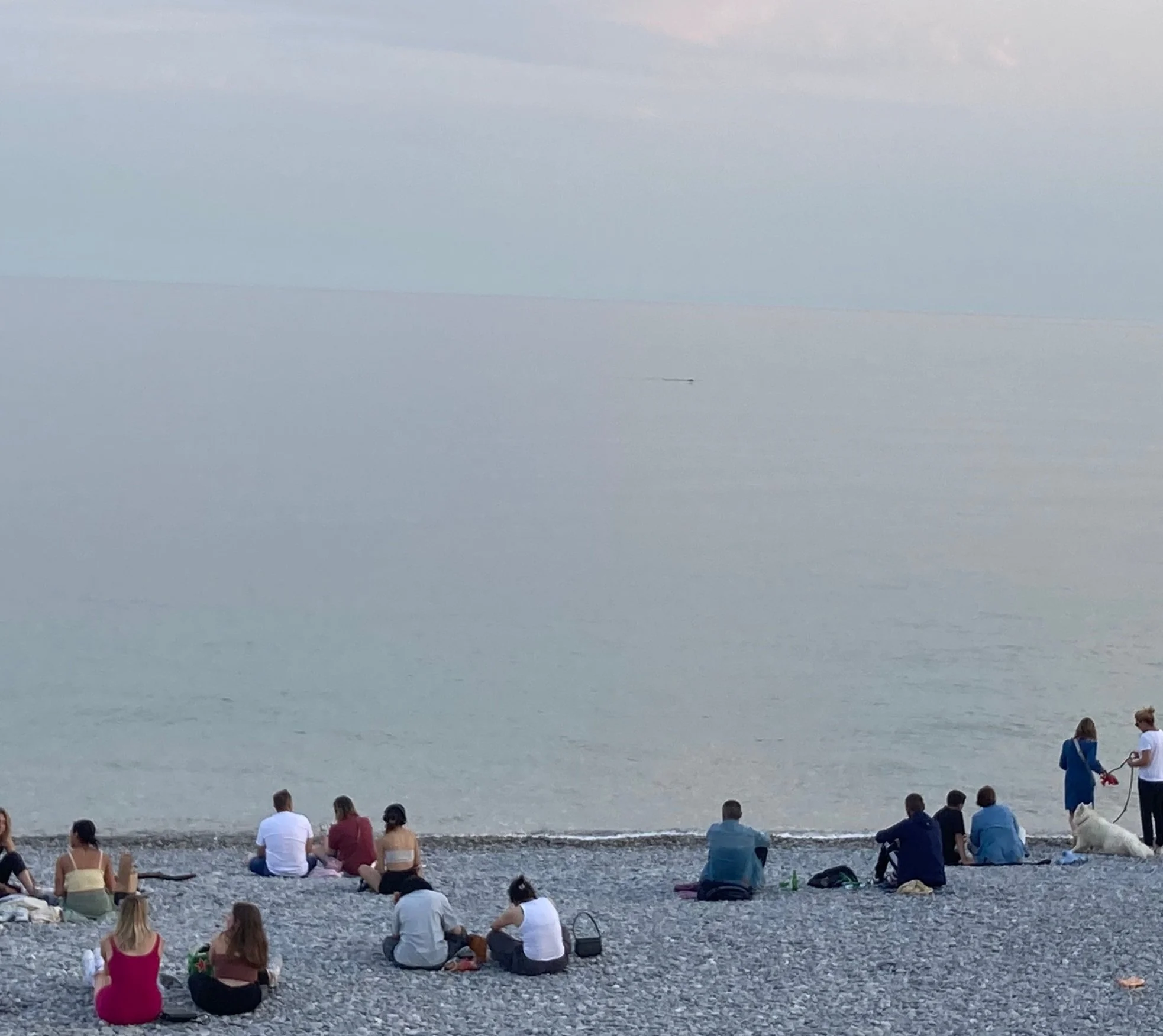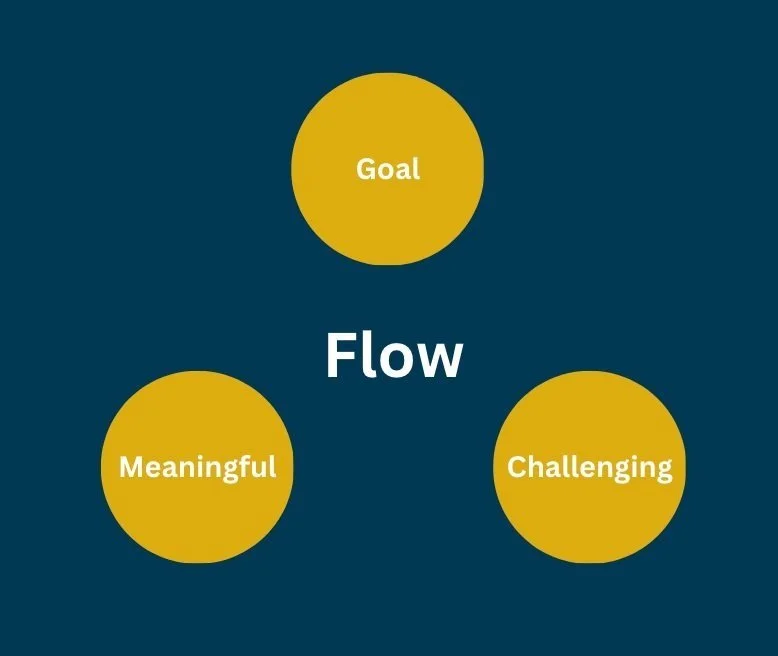Lost at Sea.
I was sitting in one of those classic French steel beach chairs when I noticed it - a spec in the Mediterranean Sea, slowly making its way across the French Riviera. It somehow looked relaxing and challenging at the same time. I mean, this swimmer was way out. It must have been challenging, but they must have been capable. They were on a mission, but also seemingly lost in the moment. That little black dot caught me by surprise. This person, swimming hundreds of metres from shore, was in their own world - lost at sea, discovering flow.
What is Flow?
In psychological terms, Flow is a state you reach when you are totally absorbed in an activity without distraction. According to Headspace, flow is when you are ‘At one with the task at hand.’ Flow can be discovered in creative pursuits, physical activity, or ordinary tasks. When you are in flow, you lose all sense of time and are absorbed in just one thing. Life just happens.
Mihaly Csikszentmihalyi first coined the concept of flow in the 1970s, which still today is prominent in the Positive Psychology movement. All those years back, Csikszentmihalyi was intrigued by artists who lost themselves in creativity; in fact he discovered they were so lost in their work they would disregard their need for food, water, and even sleep! He discovered that the very joy of flow is found in the process not the product.
As I looked out at that French swimmer, I’m not sure where he was heading or what his goal was, but I’m fairly confident he was lost in his world, out there all by himself - him, the ocean, nothing else, fully engaged in the process.
Why Flow is important?
In an increasingly fast-paced world, I feel we’re at risk of losing ourselves. The business, the demands, the relentless pressure to do something in order to be something. So much seems to be measured. We compare. We judge. We’re dirty on ourselves for falling short. We try harder. And ultimately, we judge ourselves by whether we’ve reached that lofty standard that somehow made their way into our realm. All too easily, we can end up measuring success by expectations - it’s easy to lose yourself in this space.
Ironically, Flow too is about losing yourself… losing yourself so deeply in a task that you forget about everything else competing for your attention. You lose yourself to find yourself. It’s been said that flow is the deepest form of focus that we know of, and it’s unique to who you are, not what others want you to do. Because you are at one with the task at hand, there’s a nice healthy dynamic going on between your abilities, and the challenge at hand; you hit the sweet spot.
How have we lost Flow?
Skinner, like Csikszentmihalyi, was also a hugely popular psychologist in the 1900s through his work on behaviour reinforcement. He explored the concept of how positive or negative reinforcement can convince you to focus and behave in a certain way. The problem is, over the proceeding generations, Skinner’s work on reinforcement has been used to manipulate attention, time and time again. In some rspects, Skinner explored how to manipulate focus while Csikszentmihalyi explored how to create it.
We especially see the manipulation of focus in the digital age, such as in the advertising and social media industries. Engineers design technology to get you to do what they need by making you feel a certain way through various forms of reinforcement. You only need to look as far as your child’s free iPad games, where their income is generated through advertising. Kids play the game to win coins. They need to watch advertising to win more coins, unlock more of the game, to watch more advertising - often resulting in a purchase . The cycle goes on. It’s not that the games are necessarily inherently bad, rather where focus, and ultimately time, is absorbed as a result of someone else’s agenda.
“When you repeatedly do something someone else wants you to do, even though it may feel good, you’re at risk of losing yourself.”
In our day and age, I think the manipulation of focus is winning out. I feel our society is collectively not finding enough flow. In his book Stolen Focus, Joahann argues that if we are ‘starved of flow’ we become stumps or ourselves, sensing somewhere what we might have been.’ This is hard to pick up in ourselves because we can get sucked into doing something so enticing which we feel we have chosen, but never set out to do in the first place.
So how do you find your Flow?
Three things need to align to find flow:
1.Focus on a single goal
2. Do something meaningful to you
3. Do something challenging but not impossible.
Interestingly, in my own mental health challenges, finding a sense of fun and flow was the hardest to rediscover. I wonder whether this was because enjoyment was so absent when I battled mentally… maybe it was the first to go and the last to come back? I feel as though I’m getting there now, but it’s taken work.
If you’re in the same place, one of the best ways to find your flow is to think back to when you were a child, lost and consumed by an activity. I feel it’s easier to discover flow as a child, I see it in my own three kids… flow just seems to happen organically.
When we hit adulthood, I wonder whether we begin to lose our sense of flow - things seem to compete for our attention. Maybe you feel it’s selfish, unimportant or the mood shift is just too hard. So you avoid it. If that’s you, it’s time to rediscover what makes you tick and come alive. Reflect on what comes naturally to you and pair it with a degree of challenge that helps you deeply focus on the task at hand. Maybe you can rediscover your flow in music, sport, cooking, art, reading or the outdoors. Get creative, this is one of the best ways to find yourself. Dream about this stuff, then, make it a reality.
So, is your focus controlled or created? Do you discover where your attention thrives or does someone else take that from you? Are you experiencing flow in your life? Next time you look out over water, let it be a prompt of the need to add flow into your life; to do something that makes you come alive…. to find yourself too, lost at sea.


